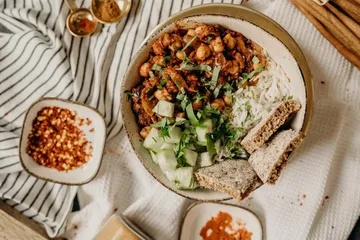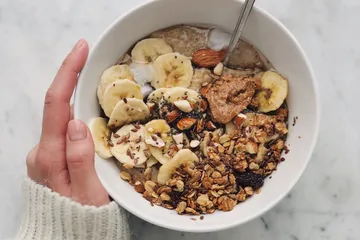Health & Wellness — Gut Health
The Best Vegan Gut Health Foods: Improve Digestion Naturally
Molly Moore / 13 June 2024

Research on the human microbiome is growing fast, and it shows just how much our gut affects our overall well-being. From boosting our immune system to improving mental health, the billions of bacteria in our digestive tract play a big role in keeping us healthy.
Vegan diets, full of fiber, fermented foods, and a variety of micronutrients, create a great relationship with our gut bacteria, leading to better digestion and overall health. We’re sharing the world of vegan foods that are great for gut health. Learn how simple dietary choices can support beneficial bacteria, improve digestion, and contribute to a vibrant life, starting right at the core of your body – the gut.

The Best Vegan Foods for Optimal Gut Health
A high-fiber plant-based diet isn't just a cornerstone of vegan nutrition; it's your ticket to optimal gut health.
For example, the beta-glucan in oats works wonders in reducing LDL cholesterol levels, while the fiber in fruit skins slows down the digestive process, helping you feel full longer and preventing overeating. By embracing a diverse diet with fiber-rich foods such as:
- Beans and Legumes: Chickpeas, lentils, black beans.
- Whole Grains: Oats, quinoa, barley.
- Seeds: Chia seeds, psyllium husk.
- Nuts: Almonds, pistachios.
- Cruciferous Vegetables: Broccoli, Brussels sprouts.
- Root Vegetables: Carrots, sweet potatoes.
You're fortifying your body's defenses against a slew of health complications while ensuring a happy and robust gut microbiome.

Fermented Vegan Foods: A Natural Source of Beneficial Bacteria
Including these fermented foods ensures a constant supply of beneficial bacteria:
- Sauerkraut: Fermented cabbage, high in Vitamin C and K.
- Kimchi: Spicy fermented vegetables.
- Kombucha: A fizzy fermented tea.
- Tempeh: Fermented soy with protein.
- Miso: Adds umami flavor and rich in probiotics.
- Natto: Sticky fermented beans with Vitamin K2.
- Pickles (Naturally Fermented): Crunchy and full of probiotics.
- Sourdough Bread: The fermentation process creates a unique profile of beneficial bacteria.

Incorporating Prebiotic-Rich foods for gut health
While probiotics have been stealing the spotlight, prebiotics are equally crucial for nourishing those beneficial gut bacteria. Regularly including the following prebiotic-rich foods will ensure your gut health is on point:
- Garlic: Rich in inulin and adds great flavor.
- Onions: Packed with prebiotics and versatile in cooking.
- Leeks: Fiber-dense and prebiotic-rich.
- Asparagus: A tasty source of inulin.
- Bananas: Contain resistant starch and make for a healthy snack.
- Jerusalem Artichokes: A tuber high in inulin.
- Dandelion Greens: Rich in fiber and great in salads.
Polyphenol-Rich Foods
Polyphenols are micronutrients with antioxidant activity, found abundantly in certain vegan foods. They can improve digestion, aid in weight management, and help to fight cardiovascular diseases. Regularly including polyphenol-rich foods in your diet enhances the growth of beneficial gut bacteria while suppressing pathogenic ones.
- Dark Chocolate (70% or Higher): Indulge in moderation for flavonoids.
- Berries: A sweet way to get a variety of polyphenols.
- Green Tea: Sip throughout the day for antioxidants and polyphenols.
Resistant Starch Foods
Resistant starch is a type of carbohydrate that, as the name suggests, resists digestion and ferments in the large intestine, serving as a prebiotic. Vegan foods high in resistant starch promote the growth of beneficial gut bacteria, contributing to a healthier digestive system.
- Cooked and Cooled Potatoes: Enjoy cold in a potato salad.
- Cooked and Cooled Rice: Perfect as a base for a refreshing salad.

Tips for Optimizing Gut Health on a Vegan Diet:
- Incorporate fermented foods: Sauerkraut, kimchi, and vegan yogurts add beneficial probiotics to your diet.
- Eat a variety of plants: Choose from a rainbow of fruits, vegetables, whole grains, and legumes to maximize gut microbiota diversity.
- Focus on dietary fiber: Aim for high-fiber foods that support the growth of good bacteria.
- Stay hydrated: Water helps dietary fiber function optimally, aiding digestion and nutrient absorption.
Why Gut Health is Important for Overall Well-being
Gut health is key to overall well-being, with our digestive tract home to a complex community of beneficial bacteria. These tiny helpers aid in digestion, boost our immune system, and protect against harmful pathogens. They also produce essential vitamins like B12, thiamine, riboflavin, and vitamin K, which are crucial for various bodily functions.
The connection between our gut bacteria and mental health is significant. The microbiome communicates with the brain, affecting our mental function and emotional state. So, a healthy gut can lead to a more balanced mood and better cognitive clarity.
Ignoring gut health can cause a range of problems beyond digestive issues. It can lead to chronic inflammation, weaken the immune response, and even contribute to physical and mental health challenges.
By maintaining a healthy gut, we ensure efficient digestion and nutrient absorption, and we support our overall physical and mental health. Taking care of our gut is an investment in our total well-being.

How Vegan Diets Promote Gut Health
Vegan diets, rich in various plant foods, help cultivate a diverse population of gut microbes. This is especially true for certain Bacteroidetes-related bacteria, which thrive on plant-based nutrition.
The high fiber content in vegan diets plays a key role, too. It helps regulate the body's inflammatory response and is linked to reduced inflammation markers in the digestive tract. This reduced inflammation is crucial for preventing many chronic illnesses associated with poor gut health.
Additionally, short-chain fatty acids (SCFAs), the beneficial byproducts produced by gut bacteria from vegan dietary fiber, act as important messengers. They interact with receptors in the body and help modulate immune and inflammatory responses.
A vegan diet also positively influences microbial metabolism, potentially reducing the risk of atherosclerosis by affecting how the body processes dietary compounds like L-carnitine, which are linked to heart health.
Adding vegan probiotic foods such as sauerkraut, kimchi, kombucha, and coconut yogurt to your diet further enhances gut health. These foods promote the growth of beneficial bacteria, creating a strong and resilient digestive ecosystem.

The Role Of Plant Based Foods In Gut Health
Plant-based foods offer a range of gut-friendly agents, from probiotics to prebiotics. Fermented vegan options like sauerkraut and kombucha deliver probiotics that replenish and nourish gut flora. On the other hand, plant-based prebiotics, mainly fibers found in vegetables, grains, and fruits, act as food for these beneficial bacteria. When included in a daily diet, they ensure that the gut microbiota not only survives but thrives.
Regularly incorporating a balanced plant-based diet stimulates the growth of probiotics naturally residing in our digestive system. This combination of prebiotics and probiotics in the diet helps maintain a healthy gut microbiota, which in turn supports efficient digestion. The benefits are extensive, including a stronger gut wall and improved overall gut function.
We think you’ll like
Get inspired with more content like this
Health & Wellness — Hormone Health
Cortisol Detox for Weight Loss: How to Reset Your Stress Hormones Naturally
Health & Wellness — Hormone Health
The Natural Ozempic Cortisol Cocktail: A Game-Changer for Stress Relief
Health & Wellness — Natural Remedies





